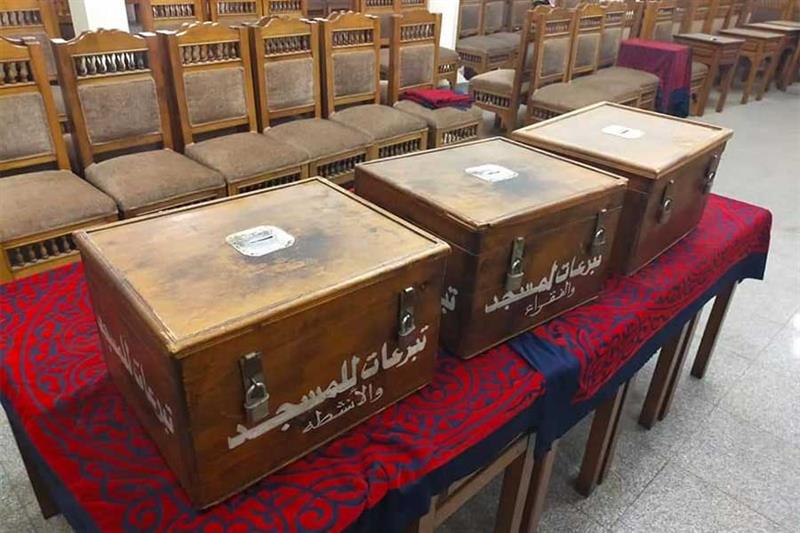
Donation boxes in mosques. Al-Ahram
Citizens can now donate directly to two-official accounts at the Central Bank of Egypt opened by the ministry.
One of the accounts is dedicated to mosque maintenance while the other is for social charity.
Many Muslim worshipers like to donate cash at mosques as a good deed for the repairing of mosques, or the provision of social services such as Quran recitation lessons and charities for surrounding community.
The ministry gave the mosques, particularly those that are not under its supervision, a 10-day grace period to remove the donation boxes ending on 11 November 2021.
There are more than 140,000 officially registered mosques nationwide, Minister of Religious Endowments Mokhtar Gomaa said in September 2020.
However, the decision does not apply to mosques run by the Sufi orders.
Sufi “vows” donation boxes
Last week, the decision was met by rejection from Egypt’s Sufi orders, which are known for their “vows” donation boxes.
“Vows” means that a Muslim vows to make a donation to a mosque or a shrine of a Sufi saint or sheikh if God grants him his wish.
The practice of “vows” is very common in grand mosques like Al-Hussein Mosque or Al-Sayeda Zeinab Mosque in Islamic Cairo. It historically goes beyond religion. The practice is not exclusive to Islam or Christianity, as it is rooted in traditional Ancient Egyptian religious systems.
Responding to the Sufi orders’ rejection, the religious endowments ministry said the “vows” donation boxes of Sufi orders’ mosques will be exempt from the decision.
The ministry also said it will issue a list of those exempted mosques within days with the names and the number of “vows” donation boxes.
Chairman of the Supreme Council of Sufism in Egypt Abdel-Hady El-Kasaby, who is also a member of parliament, said last week that there are at least 200 mosques following the Sufi orders in Egypt, with the revenue generated from “vows” donation boxes totalling EGP 30 million annually.
Even before this decision, there has always been bylaws in place that regulated the “vows” donation boxes in Sufi mosques.
According to those bylaws, 10 percent of the total annual “vows” donations go to the General Sheikhdom of the Sufi Orders in Egypt while 90 percent go to the Ministry of Religious Endowments.
Why are donation boxes in mosques being banned?
There are direct economic and security reasons behind the decision of the ministry to scrap donation boxes.
Minister Gomaa explained in recent media statements that the new regulation aims to achieve transparency and ensure the donations will actually go towards mosques’ maintenance and the provision of social services.
Gomaa added that the revenues of donation boxes were only EGP 6 million before 2014, but after modern methods in operating those boxes were applied, their revenues reached more than EGP 30 million annually right before the pandemic.
Security reasons
Egypt has been fighting radical Islamist groups that have for decades used donation boxes in some mosques as a source of finance for their operations in the absence of control or supervision on how those donations were used.
Radical Salafist groups as well as the terrorist-designated Muslim Brotherhood have previously used the boxes to finance their activities.
Also, the mosques’ donation boxes have been a target of theft for a very long time. Organised gangs would replace the original boxes filled with money with fake empty boxes, particularly in rural areas, with some thieves using paper clips to lift small amounts of cash from the boxes.
The religious endowment ministry and Supreme Council of Sufi Orders had in the past taken some measures to prevent these thefts, including installing cameras and filming how the boxes are emptied in the presence of a special committee from the ministry. Nevertheless, the thefts never stopped.
Now, with the new regulation, officials believe that thefts will cease.
Short link: